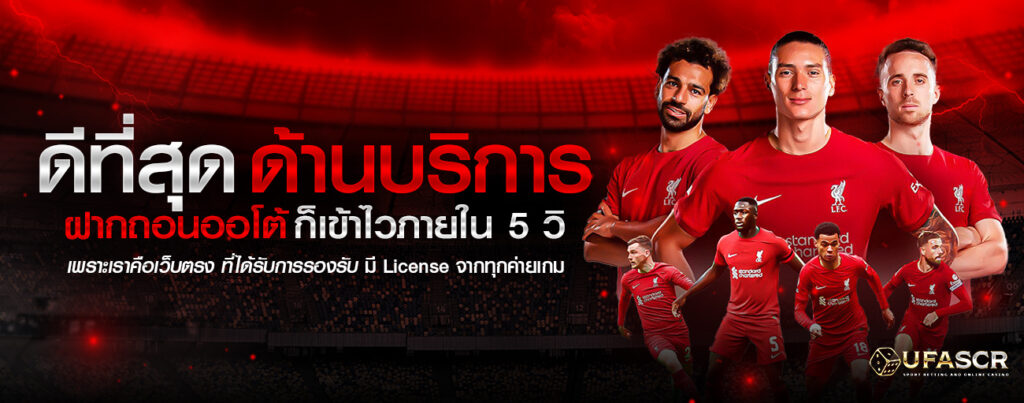

UFABET เว็บพนันออนไลน์ อันดับ 1 บริการ แบบครบวงจร ตลอด 24 ชั่วโมง
UFABET เป็น เว็บไซต์พนันออนไลน์ อันดับ 1 ของประเทศไทย และเอเชีย ที่ได้รับการยกย่อง เรื่องการบริการ และความมั่นคง ทางการเงินอย่างสูง UFABET ฝากถอน ไม่มีขั้นต่ำ เนื่องจากเราใส่ใจ คุณภาพในด้านการบริการ และประสิทธิภาพ ของเว็บไซต์ อย่างมาก ทำให้มีสมาชิก จำนวนมากให้ความเชื่อถือ กับเราและเพิ่มขึ้นอย่างต่อเนื่อง เราเป็นเว็บพนันออนไลน์ ที่บริการรับเดิมพัน แบบครบวงจร ตลอด 24 ชั่วโมง ฝาก-ถอนไม่เกิน 3 นาที อีกทั้งเรามีประสบการณ์ ในการให้บริการ เดิมพันออนไลน์ มากกว่า 10 ปี ซึ่งทำให้เราสามารถ บริหารจัดการเรื่องต่างๆ อย่างมีประสิทธิภาพสูงสุดได้
ทางเว็บไซต์ของเรา บริการรับเดิมพันต่างๆ อาทิเช่น แทงบอลออนไลน์ และ คาสิโนออนไลน์ แม้แต่ กีฬาพื้นบ้าน อย่าง หวยออนไลน์ แทงไก่ชน เกมไพ่ และเกมอีกมากมาย ให้เลือกสนุก ไม่จำกัด รวมถึงเรายังพัฒนา ทุกรายละเอียด เพื่อคนไทยโดยมีรูปแบบการเล่น ที่ไม่ซับซ้อนและสามารถเล่นได้ ทุกที่ทุกเวลา ผ่านช่องทางอินเทอร์เน็ต และ สมาร์ทโฟน ดังนั้นถ้าคุณกำลังมองหา เว็บแทงบอลออนไลน์ ที่มาแรงและดีที่สุด ไม่ต้องสงสัยว่า ยูฟ่าเบท เว็บแทงบอล เป็นเว็บไซต์ที่ตอบโจทย์ การเดิมพันออนไลน์ ของคนไทยอย่างครบวงจร และมีความเป็นมืออาชีพ ในการบริการลูกค้าที่ได้รับการยกย่อง จากผู้ใช้บริการ อย่างแพร่หลาย ทั้งนี้เพราะเราใส่ใจ และมุ่งมั่นที่จะให้บริการที่ดีที่สุด แก่ลูกค้าของเราเสมอ ไม่ว่าคุณจะเป็นสมาชิกเก่า หรือสมาชิกใหม่ เราจะให้บริการอย่างมืออาชีพ และเต็มที่ เพื่อให้คุณได้สัมผัสประสบการณ์ การเดิมพันที่ดีที่สุด อีกทั้งยังมีโปรโมชั่น และโบนัสมากมาย รอคุณเพื่อให้ได้รับประสบการณ์ การเล่น เกมออนไลน์ อย่างเต็มตัว
ด้วยความตั้งใจ ในการเพิ่มประสิทธิภาพ ของเราทุกวัน ทางเข้าฌเล่น UFABET จะยังคงพัฒนาเว็บไซต์ เพื่อให้มีความสะดวกสบาย และปลอดภัยในการ เดิมพันออนไลน์ อย่างต่อเนื่อง ดังนั้นเราขอเชิญคุณสมัครสมาชิก กับเราและร่วม เดิมพันออนไลน์กับ UFABET และเพลิดเพลินกับการเล่น เว็บเกมออนไลน์ ได้อย่างสนุกสนาน สุดมันส์ และรับรางวัลใหญ่ๆ ได้ตลอดเวลา



UFABET เว็บพนันออนไลน์ เว็บตรง ทางเข้าเล่นสู่ระบบใหม่ ครบวงจรที่สุด
เว็บพนันออนไลน์ SCRUFA4.COM เว็บตรงรายใหญ่ ของเอเชีย ซึ่งต้องยกให้ UFA ซึ่งเป็นศูนย์รวมความมั่นคง เป็นเว็บไซต์ ผู้ให้บริการครบวงจร มากที่สุด ที่ท่านสามารถเล่น เกมคาสิโน บอล บาคาร่า สล็อต และ กีฬา esport ได้อย่างมีความสนุกสนาน สะดวกสบาย และเข้าถึงได้อย่างรวดเร็ว การฝากและถอน เงินของท่านสามารถ ทำได้ผ่าน ระบบอัตโนมัติ เริ่มต้นการเดิมพัน ได้เร็วทันใจ ทั้งนี้ ท่านสามารถเล่นตรง ไม่ผ่านตัวกลาง ได้อย่างมั่นใจ เนื่องจาก แทงบอล ยูฟ่าเบท เป็นเว็บไซต์ ที่มีความเชื่อถือได้ และมีการจ่ายตอบแทนสูงสุด ที่สร้างความประทับใจ ให้กับผู้เล่นทุกท่าน ได้อย่างเต็มที่
การ สมัครสมาชิก UFA ก็เป็นสิ่งที่ง่ายมาก ๆ โดยไม่ต้องลุ้นกับโปรโมชั่น สำหรับสมาชิกใหม่ ท่านสามารถลงทุนเล่นเกมอะไรก็ได้ทันที และสามารถเรียกเงิน จากการเล่นเกม ได้เลยโดยไม่มีเงื่อนไข ซับซ้อนใดๆ อีกด้วย เป็นเว็บพนันที่มี ค่าคอมมิชชันสูงสุดถึง 0.7% และ มีค่าน้ำบอล ให้ท่านได้เลือกเล่นมากถึง 4 สตางค์ ทำให้ท่านได้ เดิมพันใน ราคาที่ดีที่สุด และยังมีค่าน้ำบอล ที่ให้คุณได้เลือกเล่น ได้อย่างหลากหลาย รวมถึงให้ราคาสุดอลังการ เพื่อให้ผู้เล่นสามารถ ได้รับเงินรางวัลที่สูงที่สุด เมื่อเดิมพันกับ UFABET หากท่านกำลังมองหา เว็บพนันที่มีความน่าเชื่อถือ รองรับการเล่นทุกรูปแบบ Scrufa มีการจ่ายเงินรางวัลสูงสุด และมีบริการลูกค้าอย่างมืออาชีพ ไม่ต้องลังเลให้ไปกับ UFA ซึ่งเป็นเว็บพนันออนไลน์ เว็บตรงรายใหญ่ แห่งเอเชีย ที่เป็นที่นิยม อย่างกว้างขวางในขณะนี้.



SCRUFA4 เว็บเดียวครบเครื่อง เรื่องแทงบอล

SCRUFA4 เป็นเว็บไซต์ ที่ให้บริการ แทงบอลออนไลน์ และเป็นเว็บไซต์ ที่ครบเครื่องที่สุดในการ เดิมพันกีฬาออนไลน์ นอกจากการแทงบอล แล้วยังมีการเดิมพัน กีฬาอื่น ๆ เช่น บาสเกตบอล แบดมินตัน วอลเลย์บอล และอื่นๆ อีกมากมาย สำหรับการใช้บริการ แทงบอล ของยูฟ่า นั้น ผู้ใช้งานจะต้องสมัครสมาชิกก่อน โดยเข้าไปที่เว็บไซต์ แล้วกรอกข้อมูลส่วนตัวตามที่ระบุไว้ จากนั้นก็เติมเงินเข้าสู่บัญชีผู้ใช้งาน เพื่อเริ่มต้นการ แทงบอลออนไลน์ สำหรับการแทงบอลออนไลน์ ผู้ใช้งานสามารถเลือกแทง ได้หลากหลายรูปแบบ เช่น แทงบอลสด แทงบอลเต็ง แทงบอลสเต็ป และอื่น ๆ โดย Scrufa ยังมีระบบฝากถอนอัตโนมัติ ที่สะดวกและรวดเร็ว ทำให้ผู้ใช้งาน สามารถทำรายการ ได้ตลอด 24 ชั่วโมง.
สำหรับการเดิมพันกีฬาอื่นๆ UFABET LOGIN ผู้ใช้งานสามารถเลือกเดิมพัน ได้ตามความชอบ รวมถึงการเดิมพัน คาสิโนออนไลน์ ที่สามารถเล่นได้ ทั้งบนเว็บไซต์ และบนมือถือ ยูฟ่าเบท เปิดบริการ เว็บแทงบอล ที่มีการคืน ค่าคอมมิชชันสูงสุด เพื่อให้สมาชิก ได้รับประสบการณ์ที่ดีที่สุด มีทีมงานคอยพัฒนาระบบ เพื่อให้สมาชิกได้รับการบริการที่ดีที่สุด และ ไม่มีขีดจำกัด สมัครเว็บแทงบอลออนไลน์และคาสิโนออนไลน์อันดับ 1 ของเมืองไทย เข้าร่วมแทงบอลออนไลน์ กีฬาต่างๆ รวมถึงคาสิโนออนไลน์กันเลย
แทงบอลยูฟ่า เว็บดี เว็บดัง ราคาน้ำสูงที่สุด ไร้ปัญหาการโกง
เว็บแทงบอล ยูฟ่า เว็บดังและเว็บดีที่สุดคือ scrufa4.com ซึ่งมีความน่าเชื่อถือสูง และได้รับการยอมรับ จากผู้เล่นมากมาย นอกจากนี้ UFA ยังมีราคาน้ำที่สูงที่สุดในตลาด และมีการอัพเดทราคาน้ำอย่างต่อเนื่อง ทำให้ผู้เล่นสามารถเข้ามาแทงบอล ได้อย่างมั่นใจว่าจะได้รับ ราคาที่ดีที่สุด และยังเป็นเว็บไซต์ ที่มีระบบการเงินที่ปลอดภัย และมีความน่าเชื่อถือสูง ไม่มีปัญหาการโกงใด ๆ เกิดขึ้น ทำให้ผู้เล่นสามารถแทงบอล ได้อย่างปลอดภัย และมั่นใจได้ นอกจากนี้ scrufa4.com ยังมีบริการลูกค้าอย่างมืออาชีพ ทีมงานพร้อมให้บริการตลอด 24 ชั่วโมง ซึ่งช่วยให้ผู้เล่นสามารถแก้ไขปัญหาหรือขอคำปรึกษาเกี่ยวกับการเดิมพันได้อย่างรวดเร็ว และสะดวกสบายอีกด้วย
สำหรับผู้ที่สนใจเข้าร่วมเว็บไซต์นี้ สามารถลงทะเบียนเข้าใช้งานได้ง่าย เว็บแทงบอล และสามารถเลือกเล่นเกมและ แทงบอล ตามความชอบได้อย่างหลากหลาย ไม่ว่าจะเป็น บอลชุด บอลเต็ง บอลสเต็ป หรือ แทงบอลสด ทั้งนี้ยังสามารถเลือกเดิมพัน ผ่านทางคอมพิวเตอร์ หรือมือถือ ได้ตามสะดวก และยังมีโปรโมชั่นและโบนัส ที่จะทำให้ผู้เล่น ได้รับประสบการณ์การ เดิมพันที่ดีที่สุด ด้วยความน่าเชื่อถือ และความปลอดภัย ที่สูงเราจึงเป็นเว็บไซต์ แทงบอลยูฟ่า ที่น่าสนใจและเหมาะสมสำหรับผู้เล่น ที่ต้องการทดลองเดิมพัน และมีประสบการณ์การเล่น ที่มั่นคงและปลอดภัย มากที่สุดในไทยตอนนี้.

เว็บพนันออนไลน์ ฝากถอนไม่มีขั้นต่ำ บริการตลอด 24 ชม

แทงบอล ไม่มีขั้นต่ำ

เกมไพ่ บาคาร่าออนไลน์

รูเล็ต บนมือถือ

เกมไพ่ เสือมังกร

สล็อตออนไลน์ สล็อตเว็บตรง

แทงบอลสูงต่ํา
ทำไมต้องเล่นเว็บ UFABET ดีอย่างไร

เว็บแทงบอล UFABET เป็นเว็บพนันออนไลน์ ที่มีความสะดวกสบาย ในการเข้าถึง รองรับทุกระบบ อุปกรณ์อิเล็กทรอนิกส์ และมีหลากหลายภาษา ให้เลือกใช้งานได้ SCRUFA4.COM นอกจากนี้ ยังเปิดให้บริการตลอด 24 ชั่วโมง และมี เกมคาสิโนออนไลน์ ที่หลากหลายมากที่สุด มีโปรโมชั่นสำหรับสมาชิกใหม่ ที่สามารถรับได้ทันที และหากเล่นเสียยังได้รับค่าคอมมิชชัน คืนทุกยอดการเดิมพันอีกด้วย อีกทั้งยังเป็นเว็บเดียวในเอเชีย ที่เปิดให้ บริการเกมกีฬา เสมือนจริงและ เกมกีฬา E-Sport ที่หลากหลาย และเหมาะสำหรับผู้เล่น ทุกเพศทุกวัย ที่สนุกได้เต็มที่และไม่มีจำกัดในการเล่น นอกจาก เกมคาสิโนออนไลน์ และเกมกีฬาเสมือนจริงแล้ว UFA ยังมีการเปิดให้เล่น เกมสล็อตออนไลน์ ที่หลากหลายและน่าสนใจ ทั้งเกมจากผู้ผลิตชื่อดัง ที่กำลังมาแรง นอกจากนี้ยังมีการจัดแคมเปญต่าง ๆ รวมถึงการแข่งขันกับผู้เล่นอื่น ๆ ทั่วโลกอีกด้วย เพื่อเพิ่มความสนุกสนาน ให้กับสมาชิกของเว็บไซต์ของทางเรา สนุกไปกับเกมเดิมพันออนไลน์ ที่ดีที่สุด
สำหรับเรื่องความปลอดภัย ทางเข้าเล่น เว็บแทงบอล มีระบบการรักษาความปลอดภัย ที่เข้มงวด เช่น การใช้ระบบ SSL ที่รักษาความปลอดภัย ของข้อมูลการเงิน และข้อมูลส่วนตัว ของสมาชิก รวมถึงมีการเข้ารหัสข้อมูล ทุกการทำรายการ ด้วยระบบการเข้ารหัสขั้นสูง ที่ไม่ให้ผู้ไม่ใช่เข้าถึง ข้อมูลของผู้ใช้งาน ดังนั้นถ้าหากคุณกำลังมองหาเว็บพนัน ที่มีความน่าเชื่อถือ และมีความหลากหลายใน เกมคาสิโนและเกมกีฬา และยังมีเกมสล็อตออนไลน์ ที่น่าสนใจอีกด้วย คุณสามารถพิจารณาใช้บริการของ ยูฟ่าเบท เว็บแทงบอล SCRUFA4.COM ได้เลย สนใจสมัครสมาชิก เพื่อรับค่าคอมมิชชันและโปรโมชั่นต่าง ๆ ที่มีให้ได้ตลอดเวลา
เว็บแทงบอลออนไลน์ SCRUFA บอลสเต็ปเริ่มต้น 2 คู่ เดิมพันไม่มีขั้นต่ำ
SCRUFA4 สำหรับนักพนันที่ชื่นชอบการ เดิมพันบอลออนไลน์ ผ่านเว็บของเรา UFABET เข้าสู่ระบบ ขอเชิญเข้ามาร่วมสนุก เล่นแทงบอล ได้เลย เว็บของเรามีรายการเดิมพัน บอลหลากหลายรูปแบบให้เลือกเล่น โดยเรามีบอลสเต็ป ให้บริการด้วย โดยท่านสามารถเดิมพัน ได้ตั้งแต่ 2 คู่แต่ไม่เกิน 15 คู่ และสามารถเลือกคู่บอล ที่ต้องการเดิมพัน ได้ตามความต้องการ ของท่านเอง แต่เราขอแนะนำให้เล่นสเต็ปบอลเพียง 3-5 คู่เท่านั้น เพราะการเดิมพันหลายคู่ อาจทำให้โอกาสได้เงินลดลงอย่างมาก แต่ถ้าเล่นสเต็ปบอลตั้งแต่ 3 คู่ ก็สามารถชนะเดิมพัน พร้อมรับเงิน ได้อย่างง่ายดาย
นอกจากนี้ เราก็มีขั้นตอนการเล่นบอลสเต็ป อย่างละเอียดให้ท่านได้ศึกษา ก่อนการเดิมพันเพื่อเพิ่ม โอกาสในการชนะเดิมพัน นอกจากนี้เว็บของเรา ยังไม่มีขั้นต่ำในการเดิมพัน เลยทีเดียว ท่านสามารถเลือกเดิมพัน ได้ตามที่ต้องการ แทงบอลผ่านมือถือ ไม่ว่าจะเป็นคนที่เล่นเงินน้อย หรือนักพนันมือใหม่ ก็สามารถ เข้ามาร่วมสนุกได้อย่างง่ายดาย

แนะนำเกมคาสิโนยอดฮิต

SA Gaming

Sexy Gaming

Pretty Gaming

Dream Gaming
สมัคร UFABET สุดยอดคาสิโนชั้นนำ ยูสเดียวเล่นได้ตลอด
UFA เป็นคาสิโนชั้นนำ ที่มีบริการให้เลือกเล่น อย่างอิสระในเว็บเดียว คาสิโนเว็บตรง สมัครครั้งเดียวเล่นได้ตลอดชีพ ไม่ต้องลงทุนเพิ่มอีกต่อไป นอกจากนี้ยังมีบริการดูบอลถ่ายทอดสด ในเว็บได้ไม่ต้องใช้ทีวี รับเงินกำไรได้เร็วกว่าใคร และเติมเงินเพื่อเล่น ได้ไม่จำกัด ฝากขั้นต่ำเพียง 1 บาท สามารถถอนเงินได้สูงสุด ไม่มีขีดจำกัด นอกจากนี้ยังเปิดให้ บริการเล่นคาสิโนกีฬา หลากหลายประเภท สล็อต จากหลายค่ายต่าง ๆ และยังมีการเปิดให้ ซื้อหวยออนไลน์ โดยลดมากถึง 30% ในแต่ละครั้งที่เล่น รวมถึงการสนุกกับการเลือกเล่น คาสิโนแบบไลฟ์สด ที่มีคุณภาพเสียง สี ดีที่สุดผ่านทางเว็บไซต์ ufa ทางเข้า นอกจากนี้ยังมีค่าย เกมคาสิโน มากกว่า 10 ค่ายให้คุณได้เลือกใช้บริการ สนุกไปกับการเล่น ได้อย่างเต็มที่ และไม่จำกัดในการเล่น
UFABET ทางเข้า ล็อคอิน มือถือ ฝากถอน ไม่มีขั้นต่ำ ครบทุกค่าย
UFABET ทางเข้ามือถือ ที่ดีที่สุด Scrufa4 ในเวลานี้ ที่มีการมอบอัตรา การจ่ายผลตอบแทน เงินรางวัลที่สูง และมีกิจกรรมเครดิตฟรี โบนัสฟรี ให้สมาชิกได้ทำไปลุ้นรับ ตลอดทุกวัน ทุกสัปดาห์ ผ่านเว็บ UFA เข้าสู่ระบบ ที่การมอบ เครดิตฟรี ของเราจะเป็นการมอบให้ด้วยระบบออโต้ ยิ่งเข้ามาเล่นกับ สมัคร UFABET มากแค่ไหน สิทธิพิเศษมากมายก็จะถูกส่งมอบกลับไปให้ทุกคนเหมือนเป็นสมาชิกระดับ VIP เช่นกัน
แทงบอล ไม่มีขั้นต่ำ นอกจากนี้ยังมีการเปิดให้บริการ ทั้งฝากและถอนเงิน ที่ไม่มีขั้นต่ำในการวางเดิมพันในทุกเกม ในทุกค่าย คาสิโนออนไลน์เว็บตรง ไม่ว่าท่านจะเป็นหน้าใหม่ หรือเซียนก็สามารถที่จะทำการลงทุน ได้ครบทุกเกม แบบที่ไม่มีขั้นต่ำ ทำให้ทุกคนสามารถ เข้ามาร่วมเล่น ได้อย่างอิสระและสะดวกสบาย อีกทั้งยังมีการบริการลูกค้า ที่เป็นมืออาชีพ และพร้อมให้บริการตลอด 24 ชั่วโมง ซึ่งสามารถติดต่อ สอบถามเพื่อรับคำปรึกษา และแก้ไขปัญหาต่างๆ ได้ทุกเมื่อ ทางเข้าเล่น สล็อตออนไลน์ ไม่มีขั้นต่ำ ทั้งนี้ยังมีการเชื่อมต่อระบบ ความปลอดภัย ที่มีคุณภาพ และมีการพัฒนาระบบเทคโนโลยี ที่ทันสมัยเพื่อรองรับ การใช้งานของสมาชิก ทุกคนอย่างเต็มประสิทธิภาพ.
คำถามที่พบบ่อย FAQ
คุณสามารถเล่นคาสิโนออนไลน์ได้ที่ UFABET ผ่านทางมือถือ คอมพิวเตอร์ โน๊ตบุ๊ค และแท็บเล็ตทุกรุ่น ไม่จำเป็นต้องซื้อเครื่องใหม่เพราะเว็บไซต์รองรับทุกแพลตฟอร์ม รวมถึงทุกระบบปฏิบัติการ ANDROID และ IOS
เมื่อต้องการเริ่มแทงบอล ผ่านเว็บไซต์ จะต้องมีการฝากเงินเข้าสู่บัญชีผู้ใช้งานก่อน โดยมีค่าธรรมเนียมการโอนเงิน ตามนโยบายของแต่ละเว็บไซต์ หลังจากนั้นจึงสามารถเริ่มต้นการแทงได้ทันที โดยการเดิมพันขั้นต่ำเริ่มต้นที่ 10 บาท และสูงสุดจะขึ้นอยู่กับคู่การแข่งขันนั้นๆ โดยเมื่อเราเลือก แทงคู่การแข่งขันใด จะมีข้อความแจ้งว่าจ่ายสูงสุดได้เท่าไหร่ ซึ่งจะแสดงให้เห็นก่อน การยืนยันการเดิมพัน เพื่อให้ผู้เล่นสามารถตรวจสอบ ได้อย่างชัดเจนก่อนการเดิมพันจริงๆ
เราเป็นเว็บไซต์ตรง ที่ไม่ผ่านเอเย่นต์ และมั่นใจว่าเราไม่มีการโกงใดๆ เกี่ยวกับการแทงบอลของผู้ใช้งาน เรามุ่งมั่นที่จะให้บริการ ที่มีความปลอดภัย และเชื่อถือได้แก่ผู้เล่นทุกคน ด้วยการใช้เทคโนโลยีที่ทันสมัย และมีประสิทธิภาพ เพื่อให้ผู้เล่นสามารถเข้าถึงบริการของเราได้ อย่างง่ายดายและไม่มีปัญหาใดๆ ดังนั้น ผู้เล่นทุกคนสามารถมั่นใจได้ว่าการแทงบอล กับเรานั้นเป็นอย่างมากในเรื่องความปลอดภัย และความเชื่อถือได้ ไม่ต้องกังวลเรื่องการโกงใดๆ เพราะเรามุ่งมั่นที่จะให้บริการที่ดีที่สุด แก่ผู้ใช้งานทุกคน
ทางทีมงานขอยืนยันว่า เราเป็นเว็บไซต์ตรง ไม่ผ่านเอเย่นต์ ที่มีความมั่นคงทางด้านการเงินสูง ดังนั้นคุณสามารถเล่นเกม ได้โดยมั่นใจว่า จะได้รับการจ่ายเงินอย่างแน่นอน ชัวร์ 100%.
การเล่นการ พนันบอลออนไลน์ นั้น ต้องเริ่มต้นด้วยการสมัครสมาชิก กับเว็บไซต์ โดยสามารถทำการสมัครได้ที่ UFABET ซึ่งมีเจ้าหน้าที่ให้บริการตลอด 24 ชั่วโมง และมีคู่สายออนไลน์มากกว่า 50 คู่ เพียงแอดไลน์มาที่ @UFASCR.V2 เจ้าหน้าที่จะช่วยแนะนำขั้นตอนการสมัคร และตรวจสอบข้อมูลของท่าน หลังจากตรวจสอบเรียบร้อยแล้ว เจ้าหน้าที่จะทำการแจ้งยูสเซอร์ ให้กับท่านเพื่อใช้ในการเข้าเล่น ท่านก็สามารถเริ่มต้น การแทงบอลออนไลน์ได้ทันที.














